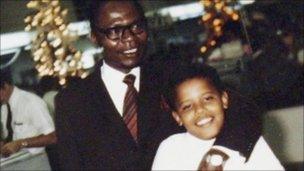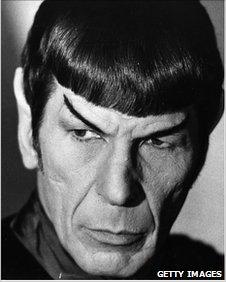Unpicking the logic of Obama's relationship with Europe
- Published
- comments
As President Obama embarks on a visit to Europe, this will be a week of politics, policy and grandiose gestures.
But this visit is also about questions of identity.
Obama is historically distinguished because of his ancestry. He's the first African-American president. But he is not going to be the last to claim Irish-American roots, when 40 million voters in the US do the same. Bluntly, the president is in Ireland to electioneer - to drink pints in a pub, in a place called Moneygall.
Today, say not Obama but O'Bama.
So in one way he'll be claiming a special personal relationship with Ireland. Those couple of words "special relationship" send British newspaper editors into the sort of neuralgic hysteria usually only achieved by teenage girls fretting if they have been purposely left out of a sleep over.

While other presidents have felt a kinship with Europe, Obama's heritage is more diverse
They can rest assured Mr Obama has accepted a sleep over with the Queen - he will be staying the night in Buckingham Palace - and will gush about the special relationship when he addresses British politicians in Westminster Hall on Wednesday.
They can dismiss from their minds the stuff from his enemies in the US - that he has inherited from his Kenyan dad a vicious Mau Mau view of the world, an out-dated communist-tinged anti-colonialism. It's nonsense.
But this visit is intended to put right a few things the White House now thinks he got wrong.
After all he is not a natural Atlanticist, rather the first Pacific president - born and brought up in Hawaii with a childhood sojourn in Indonesia.
He is not an East Coast white Anglo-Saxon, like most presidents before him, who saw England as the land of the Mayflower and dreaming spires. Maybe, if you've been told the British drove nails into your grandfather's private parts because they thought he was part of a rebellion, it gives you a different perspective.
Through Spock's eyes
When, in his big speech, last week, about the Arab spring, he associated the demonstrators with Americans who fought "a relentless tyranny... patriots who refused to pay taxes to a king," he was talking about us. But now he is sleeping with the enemy, or under the roof of George III's descendant, and if this sometimes emotionally-detached man seemed cool towards Britain it is more about logic than feelings.

Is it illogical that Europe should desire false sentimentality?
When he came into office he saw relationships with Russia and Pakistan on the wrong track, and thought China and India had been ignored. All his focus was on getting those right. Europe felt snubbed and ignored. His advisors had to have a word.
I can almost see it as a scene on the Starship Enterprise. Spock says: "But the UK and Europe are our allies out of clear self interest. It is illogical that they should desire false sentimentality. Our position is logical."
Jim puts an arm around his shoulder and says, in exasperation: "Everyone loves to be loved, Spock; wants to feel special."
Spock raises a quizzical eyebrow but changes course.
The new, logical policy explains away his earlier indifference. His administrations now say they see European states not as a focus for policy, but partners who can help change the world: a catalyst for change is the phrase being used.
Libya is the prime example, where the Americans are happy with what is happening, but don't want to do it themselves. The real worry is that now and in the future we, and the rest of Europe, won't have the military resources and the will power to do our part of the heavy lifting.
So, between Obama and Cameron, there'll be extravagant protestations of love.
But when the doors close, and the happy couple are hidden from public gaze, there may be hard questions:
are you doing enough to make this work?
it cant be one sided you know
you need to put more into this.
It sometimes clears the air to look at what, beyond emotion, makes relationships work. Even special ones.